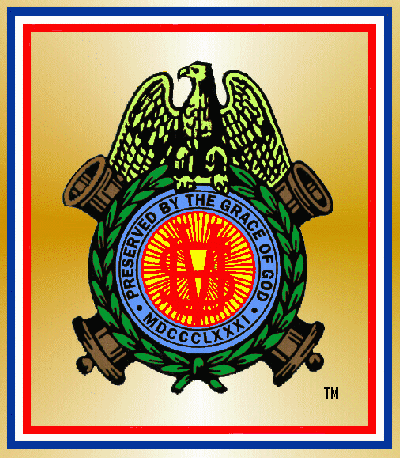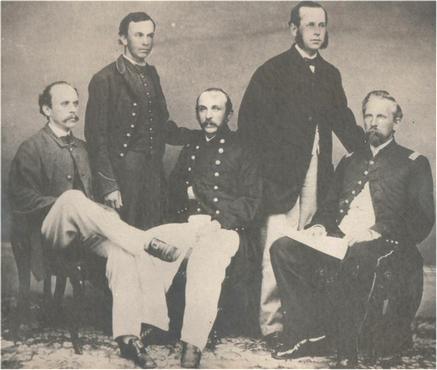Jerome Greene
Sons of Union Veterans of the Civil War


Jerome B. Greene In the midst of his old Army comrades at a reunion of the Fifth Rhode Island Heavy Artillery at Field’s Point, Dr. Jerome B. Greene, the Historian of the battery, fell dead in the arms of his old commander, Colonel Sisson, yesterday afternoon. Dr. Greene was concluding a glowing eulogy of Colonel Sisson on the brave feat of running the Confederate batteries at Little Washington, North Carolina, at the time of his demise. While seeming evidently in the full strength of his fine old age, he said, “So much for that,” referring to the war incident. “I’ve only a few more words to say,” and murmuring something of a personal nature concerning his old friend and comrade, Colonel Sisson, he tottered backward into the latter’s arms.
The tragic termination to the speech marked the conclusion of the reunion festivities, Dr. Greene’s death casting a feeling of widespread consternation among his old comrades. Governor George H. Utter and United States Senator George Peabody Wetmore had preceded Dr. Greene, and after Dr. Greene, it was anticipated that several other of the veterans would make brief remarks.
Dr. Greene was a great favorite among the veterans, and during his address, which was chiefly of a reminiscent and humorous nature, his remarks were frequently interrupted with laughter and applause. His sudden taking off was the signal for profound sorrow, and none of the veterans had the heart to continue what would have been but the mockery of a reunion.
Immediately after Dr. Greene had fallen, Dr. Frank Sexton of Brockton, formerly well known as a ball player at Brown University, who happened to be in the hall, went to the veteran’s assistance, but before he could reach the prostrate body life was extinct. A hasty examination by Dr. Sexton led to the conclusion that death resulted from apoplexy.Jerome B. Greene, Jr., son of the unfortunate man, was present, and as his father reeled and fell, he rushed to his assistance, but it was too late to give any aid. Word was immediately sent to the Seventh Police Station in this city, whence a message was dispatched to the Medical Examiner and also to Whitting & Barber, undertakers.
Dr. Greene had accompanied the veteran association to Field’s Point to participate in the reunion, where, as historian of the regiment, he was to deliver an address. He sat with the veterans throughout the dinner in the dining hall and afterward went with them to the pavilion, where the exercises of the afternoon were to take place. As he was delivering his address, he turned to Senator George Peabody Wetmore, who sat close beside him, and said: “If Colonel Sisson can’t hear me,” then suddenly pitched forward to the floor without another word. In falling, his head struck the corner of a settee and smashed Colonel Sisson’s ear trumpet, but this was not sufficient to have contributed to his death.
Dr. Greene was widely known, both in his profession, among the veterans and as a story teller. He had a fund of anecdotes, upon which he drew for the entertainment and information of his hearers. He had repeatedly written newspaper articles descriptive of battle scenes and hospital work on the field. His geniality made him a welcome guest at every function in which he participated. His sudden death cast a spell of gloom over the entire gathering of battery men, and the party disbanded shortly after it was found that their comrade was no more. The Medical Examiner Perkins was notified and the body was removed at 4 p.m.
Jerome B. Greene was a son of William and Ruth Capron Greene and was born in Uxbridge, Massachusetts, 77 years ago. After spending his boyhood in that vicinity he went to Thetford, Vermont, where he worked in a mill and attended an academy. From there he commenced to Worcester, Massachusetts, where he commenced to study medicine under a skilled physician. He made good progress at his chosen profession and afterward went to Philadelphia, where he was under Dr. Gross, a famous physician of the time, and when he took his examination he passed with high standing. The war broke out about this time and he had a chance to go to the front with several commands, but was in the West Virginia campaign early in the war with General Fremont.
A little later, when the Fifth Rhode Island Heavy Artillery was formed, he became its Assistant Surgeon. Later on, after seeing some more service, the doctor became Surgeon, with the rank of Major, and was with the regiment in that capacity for the rest of the war.
When the war was over, he finally settled in this city and had for many years had an office on Weybosset Street, No. 396, which is in the brick structure above Burrill street. He married Mrs. Elizabeth Coggeshall and several children were born to them, the surviving children of the deceased being Jerome B. Greene and Ruth Capron Greene.
Two brothers of the deceased, Dr. Willard H. Greene of South Providence and Daniel A. Greene of Pawtucket, as well as three sisters, Mrs. Ruth Arnold, who is nearly 80, Mrs. Ellen Featherstone [Sebastian Nelson’s great-great-great-great grandmother] and Mrs. Sarah Mason survive also. Five of Dr. Greene’s brothers were in the Army with him..
The picture below shows Jerome B. Greene and his brothers ( Captain Henry A. Greene, Daniel H. Greene, Willard H. Greene, and Edward W. Greene), of who also served in the Civil War. Photograph and information submitted by Sebastian Nelson, Department Historian, Department of California and Pacific, SUVCW.
__________________
Source: 1906. Obituary: Army Surgeon Dies In Comrade’s Arms, Dr. Jerome B. Greene Stricken at Veterans’ Reunion, Death Is Instantaneous, Skilful and Well-Known Physician Killed by Apoplexy at Outing of Fifth Rhode Island Artillery at Field’s Point in Midst of Eulogy of Civil War-Time Commander.Providence Daily Journal (July 28, 1906), Providence, Rhode Island.
Left to Right: Willard H. Greene, Daniel H. Greene, Jerome B. Greene, Edward W. Greene, Henry A. Greene
Circa (after) February 1865


